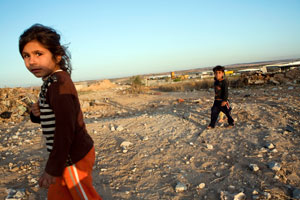
Climate change could exacerbate existing problems in the Middle East, and may in turn hold serious implications for regional security.
Credits: Katie Orlinsky/Caritas
Climate models predict that the five countries in the Eastern Mediterranean (Western Asia)– Syria, Lebanon, Israel, Jordan and the occupied Palestinian territory (oPt) – will face a hotter, drier and less predictable climate in the coming decades.
Temperatures are expected to warm by 2.5 to 3.7oC in the region’s summer months; these higher temperatures will in turn change where rain falls, how much of it falls and how often it falls. By redrawing maps of water availability, where food can be grown, and where people can live, climate change could exacerbate existing problems in the region, and may in turn hold serious implications for regional security.
The region is already one of the world’s driest. According to the Intergovernmental Panel on Climate Change, Jordan, Israel and the oPt all fall well below the internationally-set thresholds for water scarcity of 1000 cubic metres per person per year.
The Eastern Mediterranean as a whole withdraws the world’s highest proportion of its total renewable water resources (75 percent, compared to South Asia’s 25 percent, a distant second); the relative lack of rainfall and high withdrawal rates mean that the countries of the region rely more and more on groundwater and manufactured (i.e. desalinated) water.
This water crisis is happening within a context of continually growing demand. According to the UN Population Fund, the combined population of the region is expected to exceed 70 million by 2050, from 42 million in 2008 – an increase of nearly 75 percent. This significant growth will in turn increase the demand for food, water and jobs.
In a region made hotter and drier by climate change, more competition for increasingly scarce water resources could present a number of threats. It could make some existing peace accords – in which water allocations take a central role – untenable, and complicate the negotiation of new peace agreements.
It may intensify food insecurity, and in so doing raise the stakes for the return or retention of occupied land well-suited to agriculture. By hindering economic growth, climate change could worsen poverty and social instability. Shifting rainfall patterns, increasing desertification and reduced agricultural productivity could hinder economic growth, and may accelerate migration to urban centres, many of which are already stretched to meet the demand for water and public services.
The legacy of conflict in the region undermines the ability of communities and countries to adapt to climate change – years of conflict and distrust mean that countries are typically unwilling to work together to meet shared resource and environmental challenges. There are, however, ways to pursue peace and sustainable development despite the daunting challenge of a changing climate. To lessen the burden of climate stress, each country in the region can foster a culture of conservation to preserve and better use those resources they’ve already got. Support can be given to adaptation projects to help address core tensions through better water management, agricultural development and disaster prevention. Regional cooperation could provide the most efficient means of addressing the shared security implications of climate change.
An international agreement on climate change is also crucial. Without drastic action from the international community to reduce global greenhouse gas emissions, rising temperatures will mean reduced agricultural productivity, reduced water supplies, and – potentially – rising tensions in the Middle East.
Alec Crawford is co-author of Raising Temperatures, Raising Tensions: Climate change and the risk of violent conflict in the Middle East, a report prepared for the International Institute for Sustainable Development. As a guest contributors, his view do not represent those of Caritas Internationalis.
